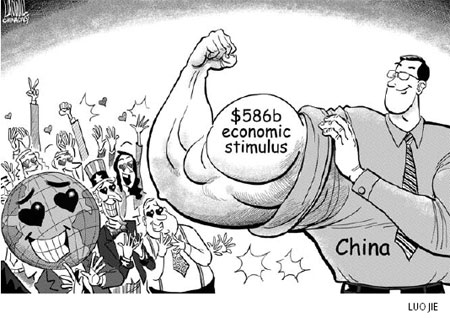
|
OPINION> Commentary
 |
|
Improving people's lives focus of govt plan
By Qi Jingmei (China Daily)
Updated: 2008-11-13 07:47  As the impact of the international financial tsunami spreads to the real economy in many countries, China's economic growth is also on a downward path, with the confidence of its enterprises and consumers hitting a new low. To reverse the adverse trend, the top authorities have resolutely decided on a policy change. Instead of the prudent fiscal and tightening monetary policy previously followed, they have now adopted a proactive fiscal and a moderately loose monetary one. The recent 4 trillion yuan ($586 billion) investment package by the State Council for the next two years will surely help curb the further sliding of the world's fourth largest economy and promote optimization of its economic growth structure. With a rapid development in the past three decades, China has made a big stride forward in the development of basic industries such as energy and raw materials and its foreign reserves have been on the rise. A continuous increase in the country's fiscal revenues has substantially consolidated the government's macro-control ability. All these have enabled the Chinese government to adopt a policy package, like Roosevelt's New Deal, to give a boost to the sliding economy. A major difference in the Chinese approach from those of other countries is that all the money in the Chinese government's investment package will be used to rescue the real economy rather than to aid affected financial bodies. The huge size of the government fund, equivalent to 16 percent of the country's gross domestic product last year, is expected not only to reactivate diminished domestic demands, but also to help fuel global economic growth. As a solid economy in the world, it is necessary for China to experience a cyclical adjustment after a round of fast-paced economic growth. Despite facing a darkening global context, the sophisticated techniques the Chinese government has exhibited in macro-control will be able to keep the country's economy running at a 9 percent growth rate. The central government also resorted to a proactive fiscal policy in 1998 after the outbreak of the Asian financial crisis, issuing a large amount of government bonds for the development of basic industries and infrastructure construction to spur economic growth. But in the latest financial package, the government promised to pump more money into projects related to people's livelihood, indicating its prime intention to use investment to stimulate consumption and then realize a sustained economic growth. At a recent State Council meeting, Premier Wen Jiabao vowed to step up the construction of low-priced and low-rent houses for urban low-income residents and the development of medical care, culture and education, especially those in underdeveloped inland areas.
A statement issued at the Nov 5 State Council meeting also stressed that effective measures will be taken to accelerate infrastructure construction mostly related with people's lives, ranging from rural methane and drinking water projects, road construction and improvement of the insufficient electricity network to urban sewage and polluted water treatment. In the document, the central government also said it would strengthen poverty relief and try to raise the income of people, especially of low-income groups, to improve their consumption ability. The primary purpose of developing the economy is to improve people's material and cultural lives and give more people access to the dividend brought by the country's development. The latest people-centered economic stimulus plan shows the Chinese government's increasing consciousness to share the national economic development with its people and resolve to change the country's economic growth structure and mode. Currently, the insufficiency in the railway transportation capacity has become a big bottleneck to hinder a bigger development of the country's economy. In its 4 trillion yuan investment plan, the central government will allot a large portion to railway construction. For example, the government will step up the construction of express passenger railways like the one between Beijing to Shanghai, reconstruction of the old pivotal rail lines such as the ones between Beijing and Harbin, from Beijing to Guangzhou and from Beijing to Shanghai. Also tens of thousands of kilometers of new railway lines are planned to be built across the country's western and southwestern regions by 2010. By that time, the developed railway network nationwide will provide a strong transportation guarantee for the country's established strategy to develop and resurrect its underdeveloped northeastern, central and western regions. It is expected that the new round of large-scale railway construction will also prod related industries and even the whole economy to develop further. For example, it is estimated that the planned 600 billion yuan investment in the railway construction the next year will create 6 million jobs for the country, and consume 200 million tons of steel and 120 million tons of cement. That will directly push the country's GDP up by a 1.5 percentage point. To curb the emerging slowdown in the country's industrial production, the central government has also decided to reform the value added tax (VAT) to remove burdens off enterprises. The adoption of the tax excluded in price policy, which means shifting the VAT from enterprises to consumers, will lower enterprises' production cost and thus will help curb inflation. With the laying down of a series of favorable measures and their implementation, there are good reasons to believe the slowing of the country's economic growth momentum will be stemmed and the decline in its corporate profits and fiscal revenues can be reversed. The author is a senior economic analyst with the State Information Center (China Daily 11/13/2008 page8) |